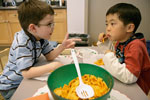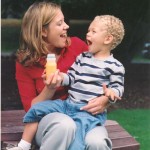 Proceedings of the National Acadmey of the Sciences of the United States of America
Proceedings of the National Acadmey of the Sciences of the United States of America
The need to delay gratification, control impulses, and moderate emotional expression is one of the earliest demands that societies place on their children, and success at many life tasks depends critically on children’s mastery of such self-control. This study looked at the lives of 1,000 children and examined their mastery of self-control by age 10. The authors then followed them for 30 years and traced the consequences of their childhood self-control for their health, wealth, and criminal offending.
 January 1, 2011
January 1, 2011 Psychologists and other early childhood experts over the past several years have begun to look closely at depression in young children, including characteristics, signs and symptoms, and long-term impact on healthy development. The impact of parental, particularly maternal, depression and other influences are also discussed.
Psychologists and other early childhood experts over the past several years have begun to look closely at depression in young children, including characteristics, signs and symptoms, and long-term impact on healthy development. The impact of parental, particularly maternal, depression and other influences are also discussed. For years, psychologists have argued that humans enter the world devoid of morality. However, a growing body of evidence suggests that humans do have a rudimentary moral sense from the very start of life, and babies can demonstrate a basic understanding of right and wrong.
For years, psychologists have argued that humans enter the world devoid of morality. However, a growing body of evidence suggests that humans do have a rudimentary moral sense from the very start of life, and babies can demonstrate a basic understanding of right and wrong. According to childcare experts, the most important thing parents can give their children is love. The second most important thing is discipline (Brazelton & Sparrow, 2003). What is discipline, and how can parents make the best decisions for their children?
According to childcare experts, the most important thing parents can give their children is love. The second most important thing is discipline (Brazelton & Sparrow, 2003). What is discipline, and how can parents make the best decisions for their children?  Serious depression in parents and caregivers affects not only the adults who are ill but also influences the the well-being of the children in their care. The first joint Working Paper from the National Scientific Council on the Developing Child and the National Forum on Early Childhood Program Evaluation summarizes recent evidence on the negative effects of severe depression on children and families. The report also highlights the need for early intervention to ensure mothers’ well-being and children’s healthy development.
Serious depression in parents and caregivers affects not only the adults who are ill but also influences the the well-being of the children in their care. The first joint Working Paper from the National Scientific Council on the Developing Child and the National Forum on Early Childhood Program Evaluation summarizes recent evidence on the negative effects of severe depression on children and families. The report also highlights the need for early intervention to ensure mothers’ well-being and children’s healthy development.  In the Sept. 14 edition of the New York Times, author Alfie Kohn wrote about the potentially detrimental effects of praise on young children. In the article, both positive reinforcement (praise) and punishment through withdrawal of attention (including time out) were described as manipulations intended to shape children’s behavior to please the adults in their life, regardless of the feelings, goals, and needs of the child. Kohn calls for parents to love their children unconditionally, instead of sending them repeated messages that they are lovable only when they behave in certain ways.
In the Sept. 14 edition of the New York Times, author Alfie Kohn wrote about the potentially detrimental effects of praise on young children. In the article, both positive reinforcement (praise) and punishment through withdrawal of attention (including time out) were described as manipulations intended to shape children’s behavior to please the adults in their life, regardless of the feelings, goals, and needs of the child. Kohn calls for parents to love their children unconditionally, instead of sending them repeated messages that they are lovable only when they behave in certain ways. Barbara Goldman and Virginia Buysse support the authenticity of friendships among the very young and among children with and without disabilities as they explore the characteristics and benefits of friendship. The authors also suggest ways parents and teachers can identify and foster friendships in young children with and without disabilities.
Barbara Goldman and Virginia Buysse support the authenticity of friendships among the very young and among children with and without disabilities as they explore the characteristics and benefits of friendship. The authors also suggest ways parents and teachers can identify and foster friendships in young children with and without disabilities.